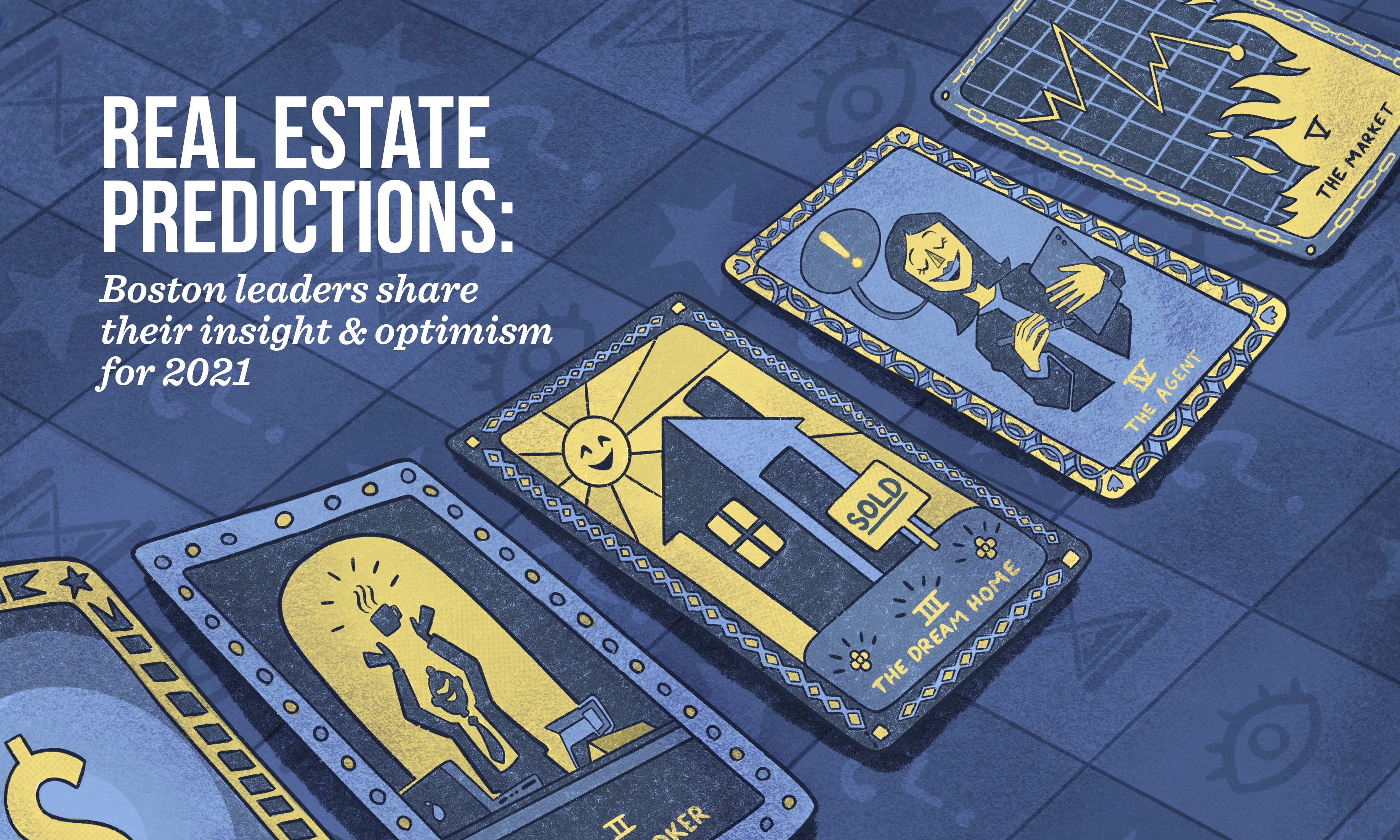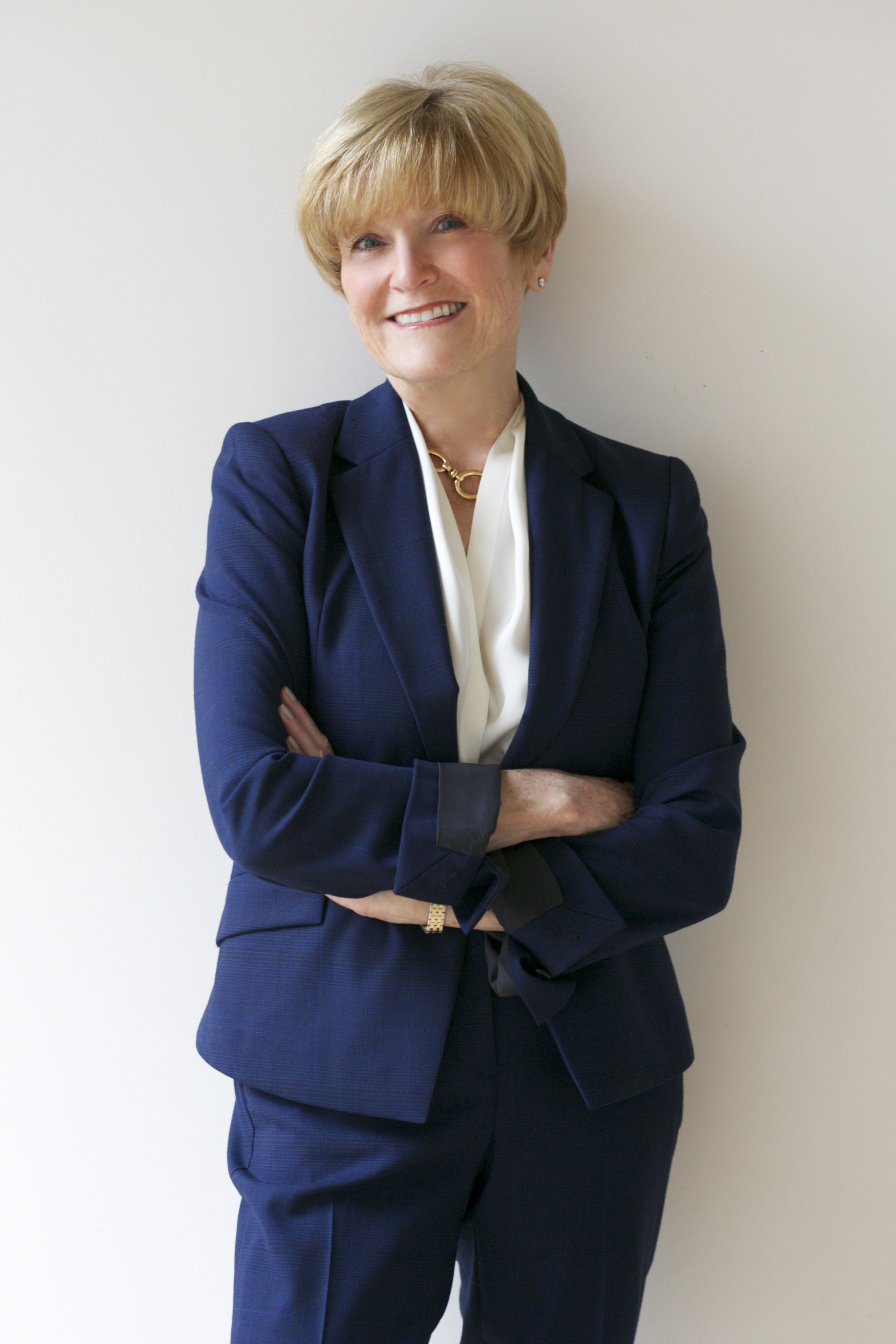Happy days are here again in 2021? With a vaccine making its way across the globe at lightening speed, there appears to be a light at the end of the pandemic tunnel, but what does the future hold for residential real estate? We spoke with some of the biggest names in Boston real estate to get their take on 2021.
Our panel of experts includes:
- Chris Raveis, president of residential sales, William Raveis, Inc.
- Sue Hawkes, managing director, The Collaborative Companies
- Anthony Lamacchia, broker/owner and CEO, Lamacchia Companies
- Nick Warren, founder and CEO, Berkshire Hathaway HomeServices Warren Residential and Titan Insurance
- Dan White, regional vice president, Draper and Kramer Mortgage Corp.
We’ve all been weathering the changes that COVID-19 brought into our lives. What revelations have you learned about your business over the last year? Will any of this apply to the way you do business in the future?
Chris Raveis, president of residential sales, William Raveis, Inc.: At William Raveis, one of the hallmarks of our business is cutting-edge technology, which enabled us to quickly pivot when the pandemic hit hard in March. Our sales associates were able to continue to do business very efficiently and effectively with all the virtual tools and technology we had developed and had in place. In Massachusetts and all throughout our nine-state footprint, our business didn’t have to stop thanks to virtual open houses; “dollhouse” viewings and 3D tours; using Zoom and FaceTime to meet with clients “face-to-face” for listing presentations; and even remote closings. We had already begun transitioning to a paperless company and the pandemic accelerated that goal as well. Now, we are finding some of these remote practices have made our business more efficient, so we look forward to even more innovations to set up our sales associates for success.
Sue Hawkes, managing director, The Collaborative Companies: 2020 has proved to be the consummate challenge for those running a business, managing people and maintaining a positive, productive attitude and focus. Developing a system for client and customer connectivity, virtually, will certainly be applicable moving forward.
Anthony Lamacchia, broker/owner and CEO, Lamacchia Companies: This pandemic proved that we are very fortunate to be in a business that truly never stops. Even at the beginning after the lockdowns, there was never a single week that less than one thousand homes were listed, or less than a thousand homes went under contract. The needs of buyers and sellers never stop, and Realtors are always ready to serve them. I will admit Realtors are even more resilient and adaptable than I even realized.
Nick Warren, founder and CEO, Berkshire Hathaway HomeServices Warren Residential and Titan Insurance: I’ve learned that we are much more resilient than we think we are. Our agents have adapted quickly and made the changes needed to continue having success during these difficult times. I’ve also learned the importance of simply checking in with people. The pandemic has given all of us a reason to pick up the phone and call or text the people we care about, which includes our clients, just to check in and see how they are doing. The impact of that simple gesture is extremely powerful when it comes to maintaining both personal and business relationships.
Dan White, regional vice president, Draper and Kramer Mortgage Corp.: We learned that our team can and does work well remotely. Our early investment in technology allowed for a largely seamless transition from working daily in an office to packing up a laptop and screens, plugging in at home and not missing a beat. We were very well positioned to flex with these unexpected circumstances and market volatility. Going forward, we expect more and more team members will want to work at least partially from home and that our brick-and-mortar footprint will be reduced.
Assuming we are still dealing with the pandemic for many months to come, what changes should we expect in the Boston real estate market in 2021? What impact will the vaccine have on the real estate market?
White: Assuming that rates remain at or near historic lows, and based on the time it will take for the economy to recover, I would expect an extremely robust market post-vaccine. Low rates translate into affordability, and when that is combined with the natural pent-up demand that the virus has created by preventing the normal course of home buying and selling, it seems reasonable to believe that the real estate market would see a significant benefit.
Hawkes: We believe that the Boston market will be experiencing a challenging 2021, one of stabilization, balance and cautious re-introduction to the urban core. The distribution of a vaccine will be paramount to the revitalization of the city.
Warren: The reasons people loved living in Boston, or any major metropolitan city for that matter, such as convenience and the overall experiences it provides for its residents, have all been turned upside down since the pandemic hit. My prediction is that it will take about 12-18 months after a vaccine is widely distributed for the energy and excitement of city living to return. But, once it does, so will the real estate market!
Lamacchia: The city of Boston was hit especially hard, and there is no doubt in my mind that it will begin to make a comeback in 2021. The notion that cities are dead forever is crazy, and everyone will realize that over the next few years.
Raveis: The Boston market has made a strong comeback in the second half of the year, and we hope to continue to see that in 2021. There is nothing like city living for people who are seeking energy and vibrancy — not to mention those wanting to be close to work for easier commutes. One of the oldest cities in the country, Boston is no exception. From its unique culture and character based in American history to the stellar food, entertainment and sports, Boston has a desirable lifestyle that endures. Once a vaccine is widely distributed, we expect to see the market continue to thrive.
All things considered, do you expect your 2021 business to thrive, decline or remain stable? Why?
Lamacchia: 2021 will be the biggest year for home sales since 2006. There is tremendous pent up demand from buyers who could not find what they wanted in 2020, and sellers who were scared to list. Both of them will come out in droves in 2021, especially once we get past April.
Warren: I believe we will have our best year ever in 2021. We are actually ahead of our 2019 numbers right now, and with interest rates where they are and potentially staying extremely low throughout 2021, a vaccine starting to be distributed, and a light at the end of the pandemic tunnel, I don’t see any reason why we shouldn’t be able to do even more sales volume in 2021 vs. 2020.
Hawkes: I expect 2021 to remain stable, while the city attempts to re-establish itself and reinvigorate the decimated retail establishments.
White: I would say that I am more excited now for the upcoming year than at any other point in my career. The way that the Draper and Kramer Mortgage’s team handled the unprecedented volume of loans in 2020 was incredible. Naturally, given the triple to quadruple increase from the typical loan volume, the time to process a refinance loan stretched a bit, but we still sustained an extremely high service level with purchase transactions remaining unaffected. More importantly, everyone treated each other with respect and kindness throughout the year. I suspect that it was not the same everywhere, and given that this is a surprisingly small industry where word gets out quickly, I am hopeful that there will be a number of talented people looking to make a move to a dynamic firm that prioritizes a healthy work/life balance.
Do you think the trend of homebuyers leaving cities for suburban areas is real, and if so, do you think it will continue in 2021? Why?
Warren: Yes, I definitely think it is real. Early on in the pandemic, I met with our agents and told them that I thought there was likely going to be a knee-jerk reaction that causes the suburban market to get hot really quick and that they should be proactively speaking with their clients about this. Since then, we’ve seen our business outside of Boston significantly increase and the market for those homes has gone crazy. I’ve seen properties that were on the market for hundreds of days all of a sudden get multiple offers. Employees and the companies they work for have had their eyes opened to the benefits of being able to work from home, so I do see the trend of more people moving to the suburbs continuing but probably not as aggressively as we have seen over the past 6-9 months.
Raveis: Throughout 2020, we’ve seen the trend of families moving to the suburbs; many are young families who would have moved eventually and have simply moved up that date by a few years. But, what we’ve also seen in the city of Boston is the opposite. People looking for a good investment in city real estate, and those reinvesting in their current space through upgrades that include outdoor areas, gardens and roof decks to improve their at-home lifestyle.
Hawkes: The “retreat” to the suburbs is very real for those who have young children, accelerating their out-migration. The empty-nesters chose to stay put in their suburban homes for the time being, however, once the city life returns, they will be back … most likely closer to 2022.
Lamacchia: As I mentioned above, the city will be BACK.
White: I would guess that it is a temporary phenomenon until sometime after the fear of the virus subsides. The city is such a powerful pull for so many, and we know that people generally have short memories when it comes to bad things happening around them. The price to live in the city may drop temporarily, but that will be further reason for people to move back.
What will be the biggest challenges and opportunities for agents, lenders and brokers in 2020?
Lamacchia: Keeping buyers happy. Inventory of homes for sale (particularly single-family homes) was at the lowest level ever before due to a massive amount of sellers who put off listing out of fear of having people in their home.
Warren: The biggest challenge for any leader during 2020 has been how to handle the uncertainty we’ve all been experiencing. Our job is to provide as much clarity as possible. Many of the headlines our clients see are written to scare rather than inform which creates the opportunity for us to clarify things and become a true advisor.
White: My hope is that the biggest challenge will still be the sheer volume of loans due to low rates, because that is a win for everyone. Homeowners either get into their dream home or improve their financial position by reducing their mortgage rate and monthly payment, and lenders and agents continue to employ more and more people to keep up with the demand to put homeowners into a better situation for their families. At Draper and Kramer Mortgage, we were able to double the size of our team in 2020.
Hawkes: One of the biggest challenges everyone in the city will face is to convince the public that it is safe to move back to the city — interest rates are low, prices are stable, if not slightly lower and the urban lifestyle will return.
How do you believe the markets will differ under a Biden presidency, if any?
Warren: Markets tend to react positively to stability, and whether you voted for Biden or not, the consensus is that his presidency should provide more of that than we’ve seen over the past four years. One of the potential benefits, which will specifically affect higher value markets like ours, is the likely removal of the SALT cap which limits itemized deductions for home mortgage interest and state and local taxes. One concern is the potential negative effect on the overall market if his proposal to eliminate 1031 exchange for real estate investors making over $400,000 in annual income. This could reduce investment in real estate across the board which might have a trickle-down effect on the rest of the market.
Hawkes: There is a concern for the prospect of higher tax rates, but otherwise the biggest concern will involve the financial markets.
White: I am hopeful that we will continue to see continued responsible easing of regulations that allow us to lend faster and more efficiently. While a reaction to the 2008 real estate crisis was clearly needed, it went too far in some cases and created a challenge for the industry to service many deserving borrowers.
Where will the hottest communities and neighborhoods be in 2021?
Raveis: Water views are always in high demand. The waterfront will continue to be an extremely desirable area especially properties with outdoor space. South Boston and Charlestown are very popular for young families. Also, the inner ring of suburbs — Brookline, Newton, Milton, Arlington, and Belmont to name a few — will remain strong given their proximity to the city.
Lamacchia: It will continue to be in the suburbs.
White: In the short term, with many folks at least temporarily exiting the city, communities within 30 minutes of Boston with good infrastructure and access to public transportation would seem to be on the short list of places where people want to live in the near future.
Warren: I think we will continue to see the suburbs remaining a hot commodity throughout 2021. Middle market towns with good schools and homes ranging from $500,000 to $1.5 million will have a tough time keeping enough inventory. I think this is an incredible opportunity for empty nesters who now have more equity than expected and can potentially get a bit of a deal on the buy side if they are looking to downsize into a condo in the city.
Hawkes: Boston’s suburban markets, South Boston, Somerville, Portsmouth NH., Worcester, Ma.
Do you think consumers will get used to virtual showings enough to keep them as a regular practice?
White: I would guess that initial showings will be done virtually a lot more often, but I think the typical buyer will want to step inside of the home before buying it. Given the fact that this is usually the largest purchase they make in their lives, buying virtually would be a pretty big leap for most.
Hawkes: Yes, as long as it’s more convenient for them or is a “pre-construction sale.” It will be particularly helpful for an initial visit, followed up by an in person visit.
Lamacchia: No, it will never stick long-term.
Warren: We have had an in house Matterport 3D camera since 2015 and were already providing 3D tours for all of our listings prior to the pandemic. The ability to provide virtual access to a property 24/7 is a huge benefit and gives buyers the confidence to move quicker than they might if they only had the chance to see a property once in person. Our clients use it to revisit a property to make sure it had everything they were looking for or even have an out of state parent feel good about helping their kids with their down payment even if they can’t see the property in person.
Raveis: While our sales associates and their clients have risen to the occasion quickly with virtual showings, nothing will replace an on-site visit for serious buyers. Video can help rule out a property but walking through a home in-person cannot really be replicated on video. Buyers need to walk through the front door and experience all the property has to offer like design, space, light, and flow. All the tangible and intangible details that make a house a home.
What do you see happening with home prices in 2021?
Hawkes: The suburban markets will continue to be strong, Boston’s urban core will soften during the first half of the year and begin rising again during the 3rd-4th quarters once excess inventory at the higher end of the market has been absorbed.
Lamacchia: They will continue to go up but not at the rate that single families did in 2020.
Warren: I think we will see average prices rise with certain pockets, specifically suburban homes, rise faster than others. Boston will likely remain stable but not see much appreciation until people are comfortable gathering in person again. If someone is interested in buying in Boston, now is a great time to do so since there is more inventory, less competition, and lower rates than we’ve seen at any point over the past decade.
Do you see a possible wave of foreclosures coming? If so, how will it impact the industry?
White: Appraised values have continued to rise, providing more equity for homeowners, and lenders have continued to provide flexibilities for borrowers that have suffered financially due to COVID-19. Therefore, while I suspect there will be damage, I am hopeful that we as an industry can continue to be creative with solutions that allow families to stay in their homes.
Do you think the number of new people getting real estate licenses will grow in 2021?
Hawkes: No – I think it will remain the same. The urban markets were in tougher shape, the suburban markets had a banner year … therefore, it will balance out.
Warren: This is a relationship business and the lack of person to person contact makes it difficult for someone to start from scratch right now. We’ve seen many part-timers leave the business because they didn’t have the network or momentum needed to carry them through the lockdowns and restrictions that were put in place. The pandemic has really separated the professional agents from the part-timers and I think it will continue to do so in 2021.
Raveis: The opportunity to generate income in real estate has been significant during 2020. This certainly may draw more eyes to becoming an agent and taking advantage of these opportunities. It doesn’t come without hard work, though. Our best sales associates are experts in the real estate market, but are also entrenched in their communities and passionate about finding their clients their optimal homes and lifestyles.
Lamacchia: Yes! people love real estate.
We’ve been told that interest rates will remain low, so what should homebuyers be watching for regarding mortgages?
White: For prospective homeowners that are looking to purchase a home in 2021, I would highly encourage them to open the lines of communication with a loan officer at Draper and Kramer Mortgage and get pre-qualified for a loan so that they are ready in a moment’s notice to make an offer and to ensure that they are regularly hearing about the current rate environment.






